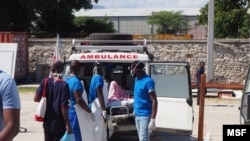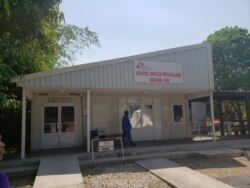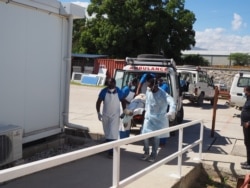Burn patients in Haiti who need specialized care had to be transferred, after gang violence erupted near the burn care hospital in Drouillard, a Port-au-Prince neighborhood.
Doctors Without Borders / Medecins Sans Frontieres (MSF) says the violence is putting its patients at risk.
"Severe burns require highly specialized care, and our Drouillard hospital is Haiti's only specialized burn care center," Dr. Alain Ngamba, MSF medical coordinator in Haiti, told VOA via email. "We are concerned about the consequences for patients who would otherwise have been admitted there."
MSF says the eruption of gunfire on February 23 sent staff members running for cover on hospital grounds. That's when it was decided to relocate 21 patients to an MSF hospital in the Tabarre neighborhood of Haiti's capital, once the shooting stopped. No staff or patients were injured during the violence, MSF told VOA.
Outpatient services for burn patients had been transferred out of Drouillard since February 13, after a first wave of gang violence. For now, only the emergency department of the hospital is open, but it is functioning at a reduced capacity and limited to accepting only life-threatening cases, MSF says.
"The situation around our hospital in Drouillard has deteriorated, for patients and for staff," Aline Serin, MSF head of mission in Haiti, said in a statement. "Faced with the recurrence of this violence, we have decided to move patients from our burn center and outpatient services to our trauma hospital in Tabarre, in order to ensure the protection of staff, the safety of our patients and continuity of their care."
MSF's Drouillard location employs about 250 staff — a mix of Haitian and international MSF employees. Originally set up as a trauma center in 2011 to treat victims of violence, road accidents or burns, the hospital shifted its focus to specialized burn care in 2014.
After the COVID-19 pandemic hit Haiti in March 2020, the Drouillard hospital temporarily shifted to treating COVID-19 patients between May and August. After August, the hospital reshifted its focus to burn care.
"We are still working to set up an operating theater in our Tabarre hospital for our existing burns patients," Ngamba told VOA. "We already treat trauma patients at our Tabarre hospital, so this does not leave many more places for burns patients. Currently we do not have the capacity to admit new patients with severe burns."
Gang violence has been a concern not only for Haitian authorities but also the international community, which raised the issue at a February 22 United Nations Security Council meeting.
"We urge Haitian authorities to redouble their efforts to investigate and prosecute violent crime," said Ambassador Jeffrey DeLaurentis, the Acting Alternate Representative for Special Political Affairs at the U.S. Mission to the United Nations.
France's deputy permanent representative to the United Nations, Nathalie Broadhurst, also criticized Haiti's government for lack of progress on curbing gang violence.
"I ask this question straightforwardly: How is it possible today that Jimmy Cherizier [notorious Haitian gang leader] is still walking free?" Broadhurst said. "The fight against impunity must be the priority of the authorities."
Responding to the criticism, Haitian President Jovenel Moise cited progress in dismantling gangs and reducing violence in his speech to the U.N. Security Council.
"Of 102 existing gangs, the government has dismantled 64 and is working to quickly to reestablish security," he said.
But as chronic insecurity continues in Port-au-Prince, MSF is calling for the respect of health facilities so that patients and staff can access them.






